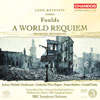Foulds (A) World Requiem
First impresssions: an enthralling, epic work that just may become a classic
View record and artist detailsRecord and Artist Details
Composer or Director: John Foulds
Genre:
Vocal
Label: Chandos
Magazine Review Date: 2/2008
Media Format: Super Audio CD
Media Runtime: 84
Mastering:
Stereo
DDD
Catalogue Number: CHSA5058

Tracks:
| Composition | Artist Credit |
|---|---|
| (A) World Requiem |
John Foulds, Composer
BBC Symphony Chorus BBC Symphony Orchestra Catherine Wyn-Rogers, Mezzo soprano Crouch End Festival Chorus Gerald Finley, Baritone Jeanne-Michèle Charbonnet, Soprano John Foulds, Composer Leon Botstein, Conductor Philharmonia Chorus Stuart Skelton, Tenor Trinity Boys' Choir |
Author: Rob Cowan
The gestation period needed to absorb fully this extraordinary World Requiem has simply not been available. So when I admit to sitting utterly enthralled by the sheer scale and impact of John Foulds’s achievement, that includes the proviso that true objectivity will only come with time – but I’m optimistic.
Foulds conducted A World Requiem’s 1923 premiere at the Festival of Remembrance, using 1250 performers. This present performance, the first in more than 70 years, was given on Remembrance Day last year, and aside from a rather unwieldy soprano, is a triumph, with special praise due to baritone Gerald Finley and conductor Leon Botstein.
A World Requiem is the kind of piece that could only have grown from wholehearted sincerity, in this case a very personal and inspired response to the devastating losses and suffering in the First World War. Cast in 20 interlinking sections, much of the work’s musical style emerges off the backs of Requiems by Verdi and Berlioz but what we actually hear is more reminiscent of Busoni, the sombre tread of the opening Requiem, the ethereal, half-lit solos and duets, and the searing climaxes, not to mention the spooky use of quarter-tones. The fifth movement “Audite” includes a stirring summons to “you men of all the continents”, an impressive roll call of nations (individually named) and a plea for universal peace.
The contrast between the sombre-hued close of the first part and the day-bright opening of the second – a celebration of deliverance – could hardly be more telling. From here on, the mood and language become more esoteric and the scoring is often extremely delicate. Sections based on texts from Revelation and the Gospel of St John lead to an affirmation of Christ’s spirit and the work ends in ecstatic joy.
Foulds’s work is as ambitiously all-embracing as Mahler’s Third or Eighth symphonies, and in its way almost as moving as Britten’s War Requiem – though these are spontaneous reactions forged in the light of a first encounter. Posterity’s work starts here but I suspect that her ultimate verdict will be pretty favourable. Calum MacDonald’s booklet-notes serve as an invaluable listening aid.
Foulds conducted A World Requiem’s 1923 premiere at the Festival of Remembrance, using 1250 performers. This present performance, the first in more than 70 years, was given on Remembrance Day last year, and aside from a rather unwieldy soprano, is a triumph, with special praise due to baritone Gerald Finley and conductor Leon Botstein.
A World Requiem is the kind of piece that could only have grown from wholehearted sincerity, in this case a very personal and inspired response to the devastating losses and suffering in the First World War. Cast in 20 interlinking sections, much of the work’s musical style emerges off the backs of Requiems by Verdi and Berlioz but what we actually hear is more reminiscent of Busoni, the sombre tread of the opening Requiem, the ethereal, half-lit solos and duets, and the searing climaxes, not to mention the spooky use of quarter-tones. The fifth movement “Audite” includes a stirring summons to “you men of all the continents”, an impressive roll call of nations (individually named) and a plea for universal peace.
The contrast between the sombre-hued close of the first part and the day-bright opening of the second – a celebration of deliverance – could hardly be more telling. From here on, the mood and language become more esoteric and the scoring is often extremely delicate. Sections based on texts from Revelation and the Gospel of St John lead to an affirmation of Christ’s spirit and the work ends in ecstatic joy.
Foulds’s work is as ambitiously all-embracing as Mahler’s Third or Eighth symphonies, and in its way almost as moving as Britten’s War Requiem – though these are spontaneous reactions forged in the light of a first encounter. Posterity’s work starts here but I suspect that her ultimate verdict will be pretty favourable. Calum MacDonald’s booklet-notes serve as an invaluable listening aid.
Explore the world’s largest classical music catalogue on Apple Music Classical.
Included with an Apple Music subscription. Download now.

Gramophone Digital Club
- Digital Edition
- Digital Archive
- Reviews Database
- Events & Offers
From £9.20 / month
Subscribe
Gramophone Club
- Print Edition
- Digital Edition
- Digital Archive
- Reviews Database
- Events & Offers
From £11.45 / month
Subscribe
If you are a library, university or other organisation that would be interested in an institutional subscription to Gramophone please click here for further information.






